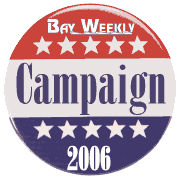 Waving from the Wings
Waving from the Wings
Behind every candidate for governor stands a lieutenant.
This week, Bay Weekly spotlights Kristen Cox and Anthony Brown.
interviewed by Sandra Olivetti Martin, Bay Weekly editor
They’re the whipped cream on the sundae, the icing on the cake, the worm on the hook. Running mates adorn a ticket. Whatever a candidate lacks, the running mate adds. All that the candidate is, the running mate polishes.
Look a little deeper, and they tell you about the comfort zones, values and strategy of the candidate.
In them you also meet a new political generation. Choice as a running mate leapfrogs a political career. The running mates of winners hop into four, maybe eight, years of shared fame, with little blame and a big potential future. Joseph Curran — father-in-law of this year’s man who would be governor, Martin O’Malley — rose to independence as Maryland’s attorney general after serving as Harry Hughes’ lieutenant from 1983 to 1987.
Yet when they try to step out of the shadow into the spotlight, many trip. Kathleen Kennedy Townsend served eight years as Parris Glendening’s lieutenant; then Robert Ehrlich closed down her show.
Michael Steele? November 7 will reveal his fate.
But we’re getting far ahead of our story. In the here and now, two chosen people, a woman and a man, come out from the wings into the limelight. We found both fascinating, and we think you will, too.
Kristen Cox
Republican Running Mate of Gov. Robert Ehrlich
Bay Weekly Tell us about a couple of influences that have shaped you, bringing you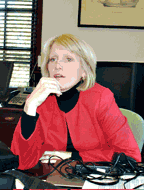 in this fullness of time to be Gov. Ehrlich’s running mate.
in this fullness of time to be Gov. Ehrlich’s running mate.
Kristen Cox My family presenting to me a firm foundation and values structure. Some of my missionary work and world travels give me perspective on how other people live in the rest of the world. There’s a lot of poverty out there. That’s been a huge influence in my life. My children add perspective.
Bay Weekly You graduated from Brigham Young University and you mention your missionary work. Are you a member of the Church of Jesus Christ of Latter Day Saints?
Kristen Cox Yes. I was born in Washington state, and my parents divorced when I was very young, three or four. My mother took me and my sister to Utah to be near her family. So I was raised by a single mom, a schoolteacher, until she remarried a man with nine kids. I lived in Utah a long time before moving here eight years ago.
Though I’m Christian more than anything, committed to the core principles any religion teaches — and we all aspire to and fall short of — of service, self-reliance and charity.
Bay Weekly You play several roles, including family woman. Tell us about your family and how you manage amidst all your other roles.
Kristen Cox My children are 10, that’s Tanner, and Riley, who has just learned how to say kitty and doggy sounds. He runs around everywhere. We live in a townhouse in Rogers Forge in Towson, and the house is a mess.
It’s all hands on deck. We try to work our schedule around the kids. My husband’s a computer guy — he works as a systems analyst — and his employer has been very supportive during the campaign season. On Sunday night, we typically pull our planners and plan who will be picking up.
Bay Weekly Gov. Ehrlich created a cabinet Office for Individuals with Disabilities and named you its first secretary. What qualifications earned you that role?
Kristen Cox In terms of policy work, being an advocate … working on Capitol Hill [for the National Federation of the Blind] … Being appointed at the federal level [by President George W. Bush as the special assistant to the commissioner of the Rehabilitation Service Administration of the U.S. Department of Education] and understanding how to get bills through and implemented.
Bay Weekly What have you hoped to achieve in that groundbreaking position?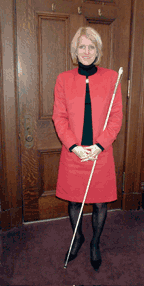
Kristen Cox At first when we started [in 2003] to be firmly founded on a set of guiding principles that reflect very high expectations about what people can do and about community integration. I am guided by the experience that people can be integrated, productive citizens and have a lot to offer.
We’ve moved forward on a variety of fronts in terms of health, mental health, education …
Bay Weekly Give me one example.
Kristen Cox On Medicaid, the governor’s funded a $10 million program that allows people with health care needs to go back to work and not lose their health care benefits. It’s a Cadillac package, very generous on eligibility because we want to incentivize productivity. Pretty much as long as a person meets Medicaid eligibility requirements and wants to go back to work, we can do it.
Bay Weekly Part of your job as Secretary is to educate people about disabilities. But isn’t the very word disabilities counterproductive to that effort? Is there a better equalizing word that takes away the negatives that word implies?
Kristen Cox There’s been an evolution in the disability field around terminology. First people were handicapped, as in the Handicapped Act of 1975. Then disabled, as in the Americans with Disabilities Act of 1990. Now we’re hearing terms like differently able.
I think it’s not up to me but to the folks with disabilities to define how comfortable they are and guide the term, and that happens in a confluence of ideas. This is the term the disabled community by and large picked up in the 1990s.
It might change. I wouldn’t be surprised.
It’s also very important for people to use people-first language: a person with disabilities rather than disabled person. We often define people by very visible characteristics; color and age define the entire person. People-first language is an effort to reinforce not who the person is but what a person has.
Bay Weekly Tell us about yourself. Is blind the correct word to use?
Kristen Cox I’m fine with it.
Bay Weekly What does that mean in your case?
Kristen Cox It means I have a little peripheral vision in my left eye.
It’s a genetic condition that showed up in fifth grade. Though there’d been signs earlier, it was not diagnosed until I was 10 or 11. It was a gradual process. It took a real dive in my late teens and early 20s with a couple of spikes in between. There were a couple of difficult transition years, but now my place in life is full and wonderful with [sight] an inconvenience I work around.
Bay Weekly Has your sight made your achievements more difficult?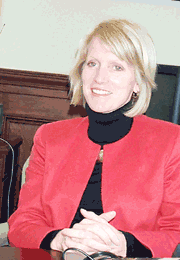
Kristen Cox You run into barriers, but I also have had the opportunity to contribute in the world of advocacy.
I am who I am. It’s hard to second guess. Would my life have been different if I were shorter or taller? If I came from Iowa instead of Utah? We embrace where we are.
Bay Weekly Are you a Braille reader?
Kristen Cox Yes, and I use auditory technology. My computer digitally translates text into speech. It’s wonderful that in the digital age, any document is available in that format. For reading to my kids and notes I use Braille as well, but I learned it later, at 26, so I’m still not very fast.
Bay Weekly Bay Weekly focuses on the environment and outdoors. Do you have a life as an outdoorswoman?
Kristen Cox Absolutely. I love it big time. I’m from Utah, and I’ve hiked mountains and the Grand Canyon. I made the bike ride from New York to Washington, D.C., to commemorate 911, on a tandem bike, of course. I love the outdoors.
Part of what attracts me to Gov. Ehrlich is his similar commitment to the environment and Bay and our efforts on that front. We visit it, play in it, but the thing with the Bay, it’s not just enjoying crabs. It’s got a comprehensive impact on our lives, our economy.
Bay Weekly As Gov. Ehrlich’s running mate, you’ve crossed fully over into politics. As you’ve traveled the state, what have Marylanders told you is deeply important to them?
Kristen Cox Education, the environment, our economy. If it’s doing well, it’s not big; if not, you hear from people. And growth is hot: We’ve got BRAC [Base Re-Alignment and Closure, bringing military jobs from elsewhere in the nation to Maryland] and people moving in.
Farming, cover crops, nitrogen usage, incentivizing dairy farmers.
I hear a lot around health care and how do we manage it.
People’s needs are very diverse so we touch on almost everything.
Bay Weekly How have these last three and a half months been different from your life before the governor settled on you?
Kristen Cox You certainly put yourself out for public scrutiny. That’s actually less bothersome than I thought. The schedule means lots of long hours. We worked hard before, but this — running a department and campaigning — it’s a very grueling schedule, and we knew that.
Bay Weekly How else have you helped the campaign?
Kristen Cox Meet-and-greets, planning, strategy, interviews, networking with volunteers, speaking at a variety of candidate forums on his behalf and mine; there were three last week.
Bay Weekly In Maryland, the lieutenant governor has no constitutional duties. What will you carve out as your focus as lieutenant governor?
Kristen Cox My big focuses are expanding health care and long-term medical care. The governor and I spoke before I agreed to run that my areas of focus would be education, health and human service. Those are the areas we’ve been impacting over four years, building up our track record.
Disabilities is still part of my portfolio, and I’ll be taking it to the next level.
There are a lot of people with disabilities in various forms and levels. One in five; just over 19 percent.
The great thing in my role as secretary is that it takes me everywhere: housing, transportation, medical and long-term care, seniors. We touch almost every aspect, so having a very diverse portfolio is nothing new.
Bay Weekly What did you stipulate in taking the job?
Kristen Cox That I’d have an absolutely meaningful role in those areas, though that was not a concern. Those were areas where we agreed I’d take the lead. My biggest concern was my family, that they would not be negatively impacted. The Ehrlichs have two young kids and are committed to having ways of managing our jobs and our families.
Bay Weekly How did you come to the governor’s attention as a running mate?
Kristen Cox I knew him [when he was in Congress and I lobbied Congress]. I worked in his cabinet for three years. We’re philosophically aligned, and he knows my track record. But my name was rumored for months before we had conversations.
Bay Weekly There’s been much made of your blindness as a qualification. On radio the other day, the governor said that if you had sight, you might not have been his running mate. How do you react to that?
Kristen Cox I heard the interview, and it was taken out of context.
In my own staff, we looked for diversity. We looked for qualified, competent people, but we also wanted people who brought different perspectives to the table because the best decisions are made out of diverse perspectives. The [Republican] statewide ticket reflects that.
I’m not affected at all that he sees blindness as a positive.
Bay Weekly As we end, tell us about a special strength you’ll bring to your lieutenancy,
Kristen Cox When people think disabled, they may not think beyond handicapped parking. But it’s large, complicated, everything from long-term care reform to reforming transportation contracts and dispatching, to education and funding in special education. I love to get into the weeds to understand how policy is written. For those in positions of leadership, it’s important to get into details. I have the ability and willingness to do that, and I have led a very substantive agency.
Anthony Brown
Democratic Running Mate of Baltimore Mayor Martin O’Malley
Bay Weekly Tell us about a couple of influences that have shaped you, making you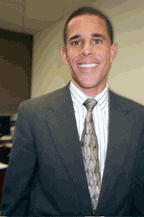 into the man Mayor O’Malley chose as his running mate?
into the man Mayor O’Malley chose as his running mate?
Anthony Brown My 82-year-old father, Dr. Roy H. Brown. He taught me the lesson of service to others, that before you can serve yourself, you have to serve other people. I watched him do that every day as a medical doctor working in some of the poor hospitals in New York state, serving some of the most underserved communities. So I grew up with commitment and passion for serving others.
Bay Weekly You play several roles, candidate, delegate, lawyer and soldier. How did you get to Iraq?
Anthony Brown I am in the Army Reserves after five years, 1984 to ’89, on active duty as an Army aviator flying helicopters.
I was entering my last year of reserve duty, my 20th year, when I got the call to serve. Like so many other Americans, I answered the call to help rebuild a war-torn country and bring stability and security to Iraq and its people.
I answered the call in May of 2004; I served in Iraq from September 12 of 2004 till June 29 of 2005. With training and debriefing, I was separated from my family for a year, July 12 to July 12.
Bay Weekly Did the House of Delegates hold your seat?
Anthony Brown Yes. The Maryland Constitution provides that the legislature can enact a law for temporary vacancies in all constitutional offices; it has done so for comptroller and attorney general, but not for the legislature.
Sen. John Astle was the last legislator before me on military leave. In Desert Storm, early 1990s, he was activated as a marine aviator, flying helicopters.
I’d also just been appointed majority whip and was looking forward to stepping up to this larger role of House leadership. But that was a temporary detour on this tour to Iraq.
Bay Weekly How about the Speaker of the House: Did Michael Busch do without a whip for that year?
Anthony Brown He held the position. Del. Brian McHale served as whip.
Bay Weekly What did you do in Iraq? Were you still flying helicopters?
Anthony Brown I continued flying helicopters five years in the reserves, before transferring to the JAG corps as a lawyer. A civil affairs unit needed a judge advocate, and I was willing.
Bay Weekly What does a judge advocate do in Iraq?
Anthony Brown We’re Army lawyers. I served as legal advisor to the commander of the 353rd Civil Affairs Command out of Fort Wadsworth, who [in turn] served under General George Casey — who is still to this day commanding the multinational force in Iraq — as his director for civil military operations.
Bay Weekly In this time when the war in Iraq keeps coming home to our communities, you’d be one of our few elected representatives who’ve actually seen it as a soldier. Is that war making us here at home safer from terrorism?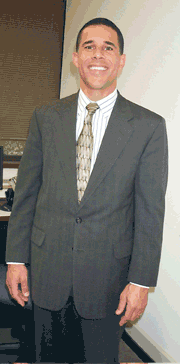
Anthony Brown I don’t believe that the insurgency in Iraq is rooted in a fear or disdain for America. It’s rooted in the ethnic and religious divisions within the society and in despair due to a lack of adequate education, health care, jobs and a secure way of life. So I don’t believe that your average insurgent would choose to fight his fight in Maryland if the United States didn’t have a troop presence in Iraq.
Bay Weekly As lieutenant governor, you won’t have a say what happens in that war, but like us all you have two votes on representatives in Congress who do. Do you want them to stay the course or bring our soldiers home?
Anthony Brown I certainly would not advise us to stay the course. That will only lead to the death of more U.S. soldiers and marines, sailors and airmen, to more men and women suffering life-altering injuries. None of that will contribute to the long-term stability of Iraq.
Bay Weekly We’re sitting in your law office. What do you do here?
Anthony Brown I’m a land-use and zoning lawyer in an administrative practice, primarily in Prince George’s County. When I was elected to the House of Delegates in 1998, I left the litigation practice in Washington, D.C., to concentrate on my public service. I practice law only to fund my public service habit.
Bay Weekly You’re also a family man. Tell us about your family.
Anthony Brown I met my wife, Pat Arzuga, in law school. She’s a health lawyer and the family breadwinner. We have two children, Jonathan, six, and, Rebecca, 11. We live in Prince George’s County, in Mitchellville.
Bay Weekly How do you manage a family life with all your other roles?
Anthony Brown I’m a full active participant in raising children, whether bringing them to doctor appointments, kung fu, horseback and violin lessons, staying at home and trying to work out of the house when they’re sick or on snow days.
Bay Weekly Do you spend time on Chesapeake Bay?
Anthony Brown We’ve been on the Bay, some kayaking and sailing with friends, some swimming — though Sandy Point State Park is [body language for not a great place to swim].
Bay Weekly What have you achieved in the House of Delegates?
Anthony Brown One of my greatest contributions is bringing people together around difficult issues to find common ground and consensus to arrive at solutions to problems. An accomplishment I’m proud of is Medical Malpractice Reform of 2004-’05. In ’04, as chairman of the House Work Group, what we did on a countless number of issues was bringing people together: the doctors, the hospitals, the malpractice insurers, the health insurers, the trial lawyers, patient advocates.
Bay Weekly Before you, Democratic Whip George Owings also served in the military. Does whip need a military background?
Anthony Brown It certainly is not a prerequisite in either the Maryland Constitution or the Rules of the House. But it does help. The majority whip articulates position of House leadership, gets the votes and enforces, promotes and encourages party discipline, and we have a very diverse Democratic Party.
Bay Weekly Are you the whip at home?
Anthony Brown I’m a very focused organized, regimented person.
Bay Weekly Would you have wanted to be your own child? 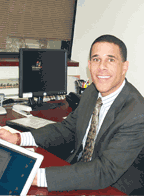
Anthony Brown I would have loved being my own child. Children like order in their lives, routine, predictability. My kids know exactly what they’re going to get from their father.
Bay Weekly What’s the trade-off in leaving the House to run for lieutenant governor? What will you lose?
Anthony Brown I give up my seat to run, so the loss of the day-to-day camaraderie with 140 others, regardless of party, all committed to advancing the common good.
Bay Weekly What will you gain?
Anthony Brown In exchange, an opportunity to more fully apply my experience and my ability to making a difference on behalf of Marylanders.
Bay Weekly In Maryland the lieutenant governor has no constitutional duties, but Mayor O’Malley must especially respect the office, as his father-in-law, retiring attorney general Jospeh Curran, was lieutenant governor. What did Mayor O’Malley promise to lure you to the job?
Anthony Brown Not so much a promise. Martin and I had extensive conversations about the role. I explained to him that I thought it important that the role be significant, meaningful and substantial. It didn’t take any convincing. Martin O’Malley fully understands the partnership between the governor, lieutenant governor and Marylanders.
Bay Weekly What will you carve out as your focus?
Anthony Brown To date, my portfolio will include taking the lead in health care, economic development and higher education, with shared responsibility for homeland security, where he has a nationwide reputation. And I’ll be a full partner in an O’Malley-Brown administration, assembling the government, setting a course and — I won’t go any further with the naval terms because I’m not a Navy person.
Bay Weekly Have you joined his band, O’Malley’s March?
Anthony Brown The band would be in trouble.
Bay Weekly Do you bring the ticket victory in Prince George’s County? Political analysts say O’Malley-Brown has to win there to beat Ehrlich-Cox. But the big race there, for county executive, was pretty much decided at the primary. What are you doing in the next two weeks to turn out PG voters?
Anthony Brown We’re going to do what has been done each and every campaign, bring directly to voters our message of fighting for families and expanding opportunities. That message resonates in Prince George’s County no differently than in Allegany County.
Bay Weekly Diversity is a talked-about value in this campaign, and the Maryland Republican ticket boasts diversity not only in gender and race but also in disability. In Maryland’s statewide Democratic ticket — governor, senator, and comptroller — you’re the only one who isn’t a middle-aged white guy. Does that hurt your party’s chances?
Anthony Brown No. The Democratic Party in Maryland and the country is still the party that believes that government can be part of the solution — unlike the Republican Party, which seeks to reduce and minimize government no matter who gets left behind.
Bay Weekly In society, on the other hand, diversity has passed a tipping point that makes our 20th century language seem retro. But we’re not yet race or color blind. What’s the term for our time? Are you African American, black, brown or simply American?
Anthony Brown When I talk with Jamaican friends, we’re very comfortable calling ourselves black. I refer to myself as African American. I am a man of African descent who lives in America. African American is very much a term that is used and accurately defines many of us who live in this country.
I think that more important than a label is whether you recognize the cultural diversity of a people, the racial diversity of a state and that despite background there is more that unites us than divides us.
Bay Weekly As you’ve traveled the state, what have Marylanders told you is deeply important to them?
Anthony Brown Exactly the same things as I saw in Iraq. As we have traveled the state, the issues that come up in every community are education, health care and public safety. But the one thing that comes up most [reflects] a lesson I learned in Iraq, where it’s so obvious that people are yearning for a government whose leadership works for people, is more concerned with making progress than politics, a leadership committed to the public interest rather than special interest. But it’s equally true here. Marylanders are yearning for a government that puts people first.